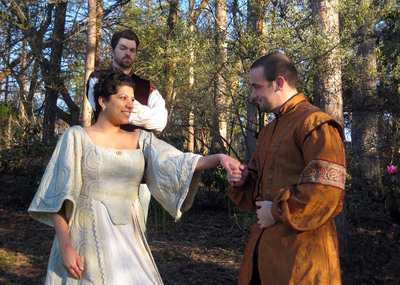Shakespeare in the Arb presenting a summer production of 'The Winter's Tale'

Leontes (Graham Atkin) is suspicious of his wife, Hermione (Maria Thomas) and his best friend Polixenes (Sam Dodge) during a rehearsal for "A Winter's Tale."
photo by Gail McCormick
“But there’s really nothing in the play (about winter) except for a line by the young prince: ‘A sad tale is best for winter,’” said Mendeloff. “ … And perhaps the beginning is usually set in the winter, but it doesn’t need to be. … So I got over that, because I think the other benefits of doing the play in the Arb were stronger than the reasons not to.”
Of course, with loads of rainfall and unseasonably cold temperatures plaguing Mendeloff and her actors this spring, May has been (appropriately?) more winter-like than usual.
“We rehearse outside 3 days a week, and we have had to have over half, even three-quarters, of them inside the Reader Center, which is challenging,” said Mendeloff. “It is a big play—lots of characters, and a pastoral section that is very dependent on being in the actual setting. We are doing three dances, two courtly ones and one peasant dance, and these are not easy to fit into our rehearsal room, which is also our costume and prop storage area. But I have a good group of actors and we are moving along.”
Plus, it’s a big group, since Mendeloff double-cast nearly all the roles (“I had a lot of good actors come out for auditions,” said Mendeloff); and because the show (and the audience) traditionally “travels” on foot to different areas of Nichols Arboretum throughout the show, to witness different scenes in different settings, it’s been particularly challenging to experiment with this year’s chosen sites.
But all this hasn’t dampened Mendeloff’s affection for the play, which tells the story of a king who sends his pregnant wife to persuade a visiting king (and close friend) to extend his visit. When the queen succeeds, her husband irrationally grows convinced that his wife and his friend are having an affair. Consequently, the visiting king flees into hiding; the wife is imprisoned, and reportedly dies after hearing news of her son’s death; and the baby she bears is “delegitimized” and banished. 16 years later, the surviving characters’ paths cross again, and past injustices are finally addressed.
PREVIEW
”The Winter’s Tale”
- Who: Shakespeare in the Arb.
- What: Annual presentation of a Shakespeare play outside in Nichols Arboretum. Actors and audience move to various locations in the Arb during the course of the play.
- Where: Nichols Arboretum, 1610 Washington Heights.
- When: June 9-12, 16-19, and 23-26. All performances begin at 6:30 p.m., but attendees should allow 10 minutes to walk to the show’s starting point. The box office opens to the public at 5:30 p.m.
- How much: $18 general admission (seniors $16; students and children 5-18, $10; children under 5 are free). Call 734-647-7600 for more information.
One of the first things that inspired Mendeloff’s deep affection for “Tale” was a Margaret Jowett novel that Mendeloff read at age 8, called “Candidate for Fame,” which focuses on a young actress who plays Perdita at the Drury Lane Theatre during the Restoration.
But also, while a grad student at Yale Drama School, Mendeloff directed a production of “Tale” that she never got to see, due to health issues. “So it felt like a piece of unfinished business to me,” said Mendeloff.
While doing research for her current production, Mendeloff learned that the main story seems to have been inspired by the relationship between Henry VIII and Anne Boleyn (whose daughter, Elizabeth, was “delegitimized” following her mother’s death); and the character of Leontes appears to be a critique of the autocratic style of King James.
And while you might think that “Tale” marks a turn away from the bard’s lighter comedies—Shakespeare in the Arb has previously presented “Midsummer Night’s Dream,” “As You Like It,” and “Love’s Labors Lost,” among others—Mendeloff is quick to point out that even Shakespeare’s silliest fare is haunted by violence and dark undertones.
“The balance (in ‘Tale’) is a little different, in that all of the heavy stuff happens in the first 3 acts,” Mendeloff said. “But every Shakespeare play has a level of injustice in it, and tyrants who overstep their bounds.”
Jenn McKee is the entertainment digital journalist for AnnArbor.com. Reach her at jennmckee@annarbor.com or 734-623-2546, and follow her on Twitter @jennmckee.


Comments
Will Warner
Sat, Jun 4, 2011 : 11:38 a.m.
It may seem strange to watch Shakespeare in the Arb, but it's kind of fun. Everyone sits pretty close to the actors (bring a chair). And actually picking up and moving to the site of the next scene gives opportunities to talk with others in the audience, especially people you don't know -- the oddity of it breaks the ice. Perhaps in time we'll see there the Complete Works of Shakespeare, "Arb-ridged."